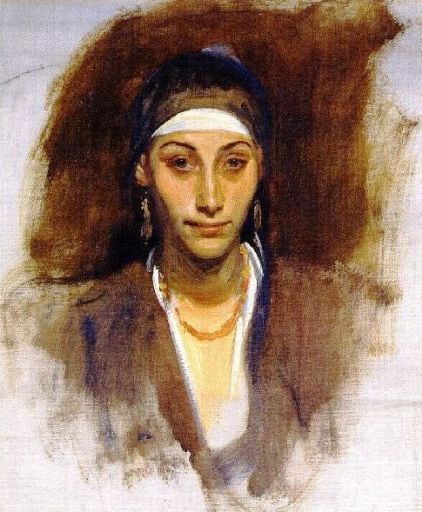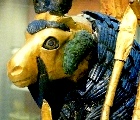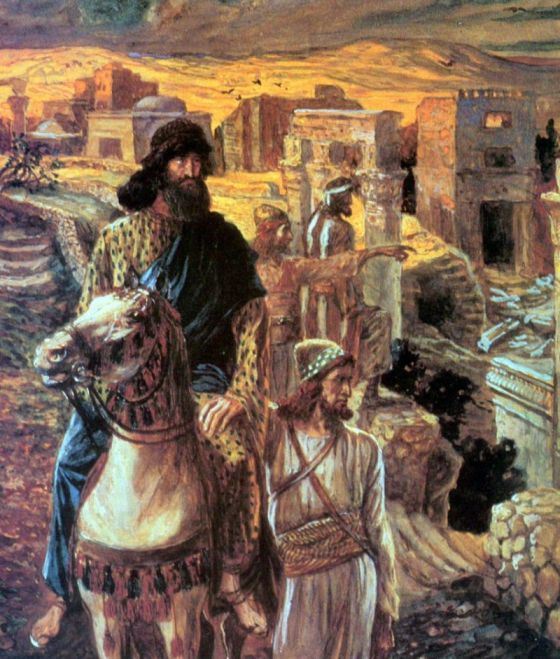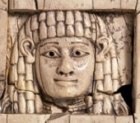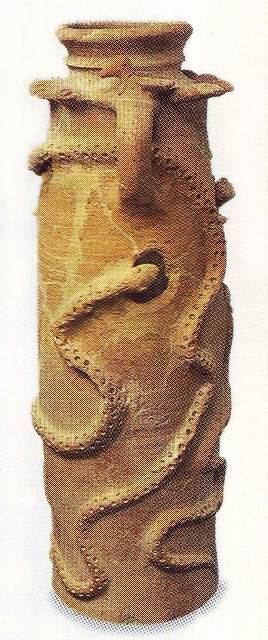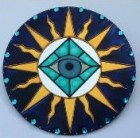Hulda, prophetess, listens for God’s voice
A dangerous time in Jerusalem

‘Huldah’ means ‘weasel’
Huldah’s story appears at a pivotal moment in Jewish history, in about 624BC. There are two things to keep in mind as you read it:
- For years, Judah and Israel had been worshipping a whole range of gods/goddesses, mainly related to agriculture: rain, crops, agricultural seasons. They had been worshipping these deities in shrines all over the country. Some of these were large, important shrines, some just little road-side shrines where offerings were made to the local gods. These practices reflect the customs of the great Assyrian empire, to which Israel/Judah paid tribute. The country had, to some extent, been ‘Assyrian-ised’.
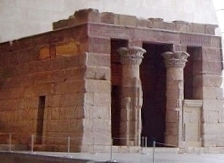
The Jerusalem Temple was in disrepair, similar to the Temple of Dendur above.
- But Assyria’s power had been declining (too many wars, too large an area to defend) and Jerusalem had begun to think of flexing its muscles and perhaps throwing off the Assyrian yoke. In response to this, Jerusalem was trying to reassert the power it once had. Its king, Josiah, had begun a sort of ethnic cleansing, in which the customs and practices with an Assyrian flavour, especially to do with religion, were being suppressed, and believers in these practices eliminated.
What happened then?
At this pivotal moment in history, an ancient scroll/book of the Law was found at the bottom of a money chest that had recently been raided to pay for renovations to the Temple in Jerusalem.
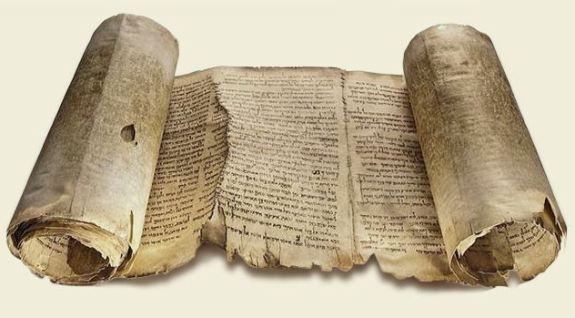
Ancient scroll of the Bible, Book of Isaiah
What was in this scroll? Scholars think it was probably a section of the Book of Deuteronomy, because it was supposed to have been lost during the wholesale destruction of anything to do with worship of Yahweh, during the reigns of the previous two kings who were hostile to all things relating worship of Yahweh.
It was many years since the words on the scroll had been read by anyone, and King Josiah wanted their meaning explained to him.
Who could do it?
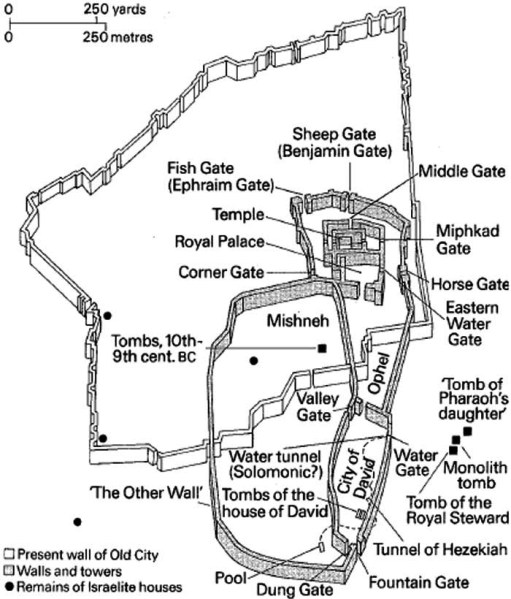
Map of Jerusalem at the time of Huldah
Enter Huldah – who was she?
Huldah was a scholar/seer of high social rank in Jerusalem. Her husband was Shallum, keeper of the royal wardrobe.
What? you say, a tailor/wardrobe organizer? How can that be important?
Because the Keeper of the Royal Wardrobe
- had daily access to the king and
- met him in relative privacy, in an intimate setting.
Such a man was better placed than almost anyone to talk with the king, advise him, suggest a preferred course of action.
Some of the most powerful men in history, behind the scenes, have been members of the king’s personal entourage. Huldah was among the inner circle surrounding King Josiah.
In the small world of the Jerusalem elite, Huldah was well-known for her scholarship, but even so it is extraordinary that she interpreted God’s meaning, and was believed.
Her name ‘Huldah’ means ‘a burrowing animal’. Scholars, in their own way, burrow, seeking out and examining little pieces of knowledge/wisdom to nourish the mind and heart. Huldah was just such a scholar.
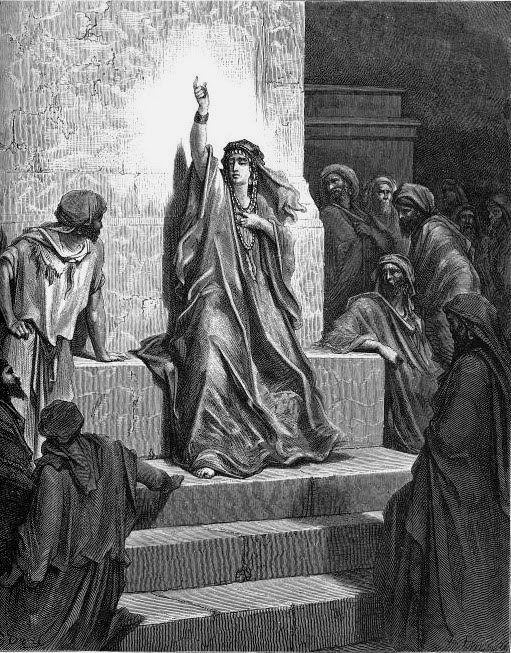
In tradition, Huldah is said to have given her prophesies
at a place now called Huldah’s Gate in Jerusalem
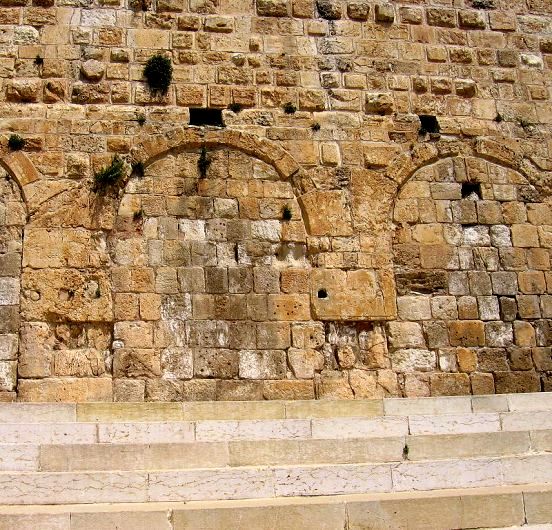
Huldah’s Gate in present-day Jerusalem. The stones pictured above are part of the reconstructed Temple platform from the time of King Herod the Great, 1st century AD. They may be approximately where Huldah stood in the 600’s BC.
Huldah’s instructions to King Josiah
Huldah was a woman with authority. People listened to what she said.
And what she said is that the finding of this scroll was a direct message from God. It described a covenant between God and the people, similar to vassal treaties of the period.
What was its main point? The Davidic dynasty was the one that God intended to rule over Israel. No other man, however capable, was acceptable to God.
Huldah spoke directly, to the point. Disaster was about to strike, she said. The people had abandoned Yahwah and turned to the worship of other gods, most notably the weather gods.
So God’s wrath had been kindled against the people of Judah, and they could not escape destruction. They would be punished for abandoning God.
Only the king, Josiah, would be spared. He had done his best to lead the people back to Yahweh, and so he would be ‘gathered to his ancestors’ (die) before all the terrible things that were to happen.
Did Huldah’s prophecy come true?
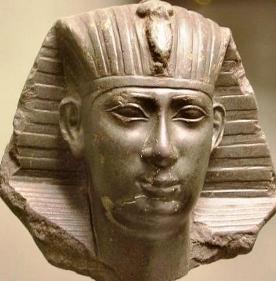
The Egyptian Pharaoh Necko
Meanwhile, Assyria had been having its own problems. Both the Medes and the Egyptians had been expanding their power, and Josiah seems unfortunately to have backed the wrong side.
He tried to halt the Egyptian army near Megiddo, a key spot on the great highway between Egypt and the north, and was badly wounded at the beginning of the battle with the Egyptian Pharaoh Necho (see right).
He died soon after (2 Kings 23:29). The king’s servants put their master’s body in a chariot and brought it to Jerusalem, where it was buried. His son Jehoahaz became the next king.
What happened to Huldah, we do not know.
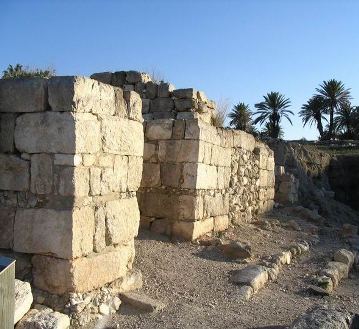
The gates of the ancient city of Megiddo, where Josiah died
Name meanings in Huldah’s story
Hul’-da or Hulda, meaning a ‘weasel’ or burrowing animal; Hulda’s scroll was found hidden at the bottom of an old chest
King Josiah, ruler of Judah in a dangerous period of its history
Shallum, keeper of the king’s wardrobe, an influential man
What’s the main theme of Hulda’s story?
- The importance of always listening for God’s voice, wherever it comes from
The Bible text
2 Kings 22:8-20
8 And Hilki’ah the high priest said to Shaphan the secretary, “I have found the book of the law in the house of the LORD.” And Hilki’ah gave the book to Shaphan, and he read it. 9 And Shaphan the secretary came to the king, and reported to the king, “Your servants have emptied out the money that was found in the house, and have delivered it into the hand of the workmen who have the oversight of the house of the LORD.”
10 Then Shaphan the secretary told the king, “Hilki’ah the priest has given me a book.” And Shaphan read it before the king.
11 And when the king heard the words of the book of the law, he rent his clothes.
12 And the king commanded Hilki’ah the priest, and Ahi’kam the son of Shaphan, and Achbor the son of Micai’ah, and Shaphan the secretary, and Asai’ah the king’s servant, saying, 13 “Go, inquire of the LORD for me, and for the people, and for all Judah, concerning the words of this book that has been found; for great is the wrath of the LORD that is kindled against us, because our fathers have not obeyed the words of this book, to do according to all that is written concerning us.”
14 So Hilki’ah the priest, and Ahi’kam, and Achbor, and Shaphan, and Asai’ah went to Huldah the prophetess, the wife of Shallum the son of Tikvah, son of Harhas, keeper of the wardrobe (now she dwelt in Jerusalem in the Second Quarter); and they talked with her.
15 And she said to them, “Thus says the LORD, the God of Israel: ‘Tell the man who sent you to me, 16 Thus says the LORD, Behold, I will bring evil upon this place and upon its inhabitants, all the words of the book which the king of Judah has read. 17 Because they have forsaken me and have burned incense to other gods, that they might provoke me to anger with all the work of their hands, therefore my wrath will be kindled against this place, and it will not be quenched.
18 But as to the king of Judah, who sent you to inquire of the LORD, thus shall you say to him, Thus says the LORD, the God of Israel: Regarding the words which you have heard, 19 because your heart was penitent, and you humbled yourself before the LORD, when you heard how I spoke against this place, and against its inhabitants, that they should become a desolation and a curse, and you have rent your clothes and wept before me, I also have heard you, says the LORD.
20 Therefore, behold, I will gather you to your fathers, and you shall be gathered to your grave in peace, and your eyes shall not see all the evil which I will bring upon this place.'” And they brought back word to the king.
Chronicles 34:14-28
14 While they were bringing out the money that had been brought into the house of the LORD, Hilki’ah the priest found the book of the law of the LORD given through Moses. 15 Then Hilki’ah said to Shaphan the secretary, “I have found the book of the law in the house of the LORD”; and Hilki’ah gave the book to Shaphan. 16 Shaphan brought the book to the king, and further reported to the king, “All that was committed to your servants they are doing. 17 They have emptied out the money that was found in the house of the LORD and have delivered it into the hand of the overseers and the workmen.”
18 Then Shaphan the secretary told the king, “Hilki’ah the priest has given me a book.” And Shaphan read it before the king. 19 When the king heard the words of the law he rent his clothes. 20 And the king commanded Hilki’ah, Ahi’kam the son of Shaphan, Abdon the son of Micah, Shaphan the secretary, and Asai’ah the king’s servant, saying,
21 “Go, inquire of the LORD for me and for those who are left in Israel and in Judah, concerning the words of the book that has been found; for great is the wrath of the LORD that is poured out on us, because our fathers have not kept the word of the LORD, to do according to all that is written in this book.”
22 So Hilki’ah and those whom the king had sent went to Huldah the prophetess, the wife of Shallum the son of Tokhath, son of Hasrah, keeper of the wardrobe (now she dwelt in Jerusalem in the Second Quarter) and spoke to her to that effect.
23 And she said to them, “Thus says the LORD, the God of Israel: ‘Tell the man who sent you to me, 24 Thus says the LORD, Behold, I will bring evil upon this place and upon its inhabitants, all the curses that are written in the book which was read before the king of Judah. 25 Because they have forsaken me and have burned incense to other gods, that they might provoke me to anger with all the works of their hands, therefore my wrath will be poured out upon this place and will not be quenched.
26 But to the king of Judah, who sent you to inquire of the LORD, thus shall you say to him, Thus says the LORD, the God of Israel: Regarding the words which you have heard, 27 because your heart was penitent and you humbled yourself before God when you heard his words against this place and its inhabitants, and you have humbled yourself before me, and have rent your clothes and wept before me, I also have heard you, says the LORD.
28 Behold, I will gather you to your fathers, and you shall be gathered to your grave in peace, and your eyes shall not see all the evil which I will bring upon this place and its inhabitants.'” And they brought back word to the king.
Search Box
![]()
Bible Study Resource
Women in the Bible
Huldah, prophetess, adviser to King Josiah
Search Box
![]()
© Copyright 2006
Elizabeth Fletcher

